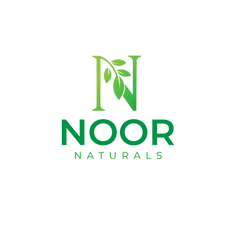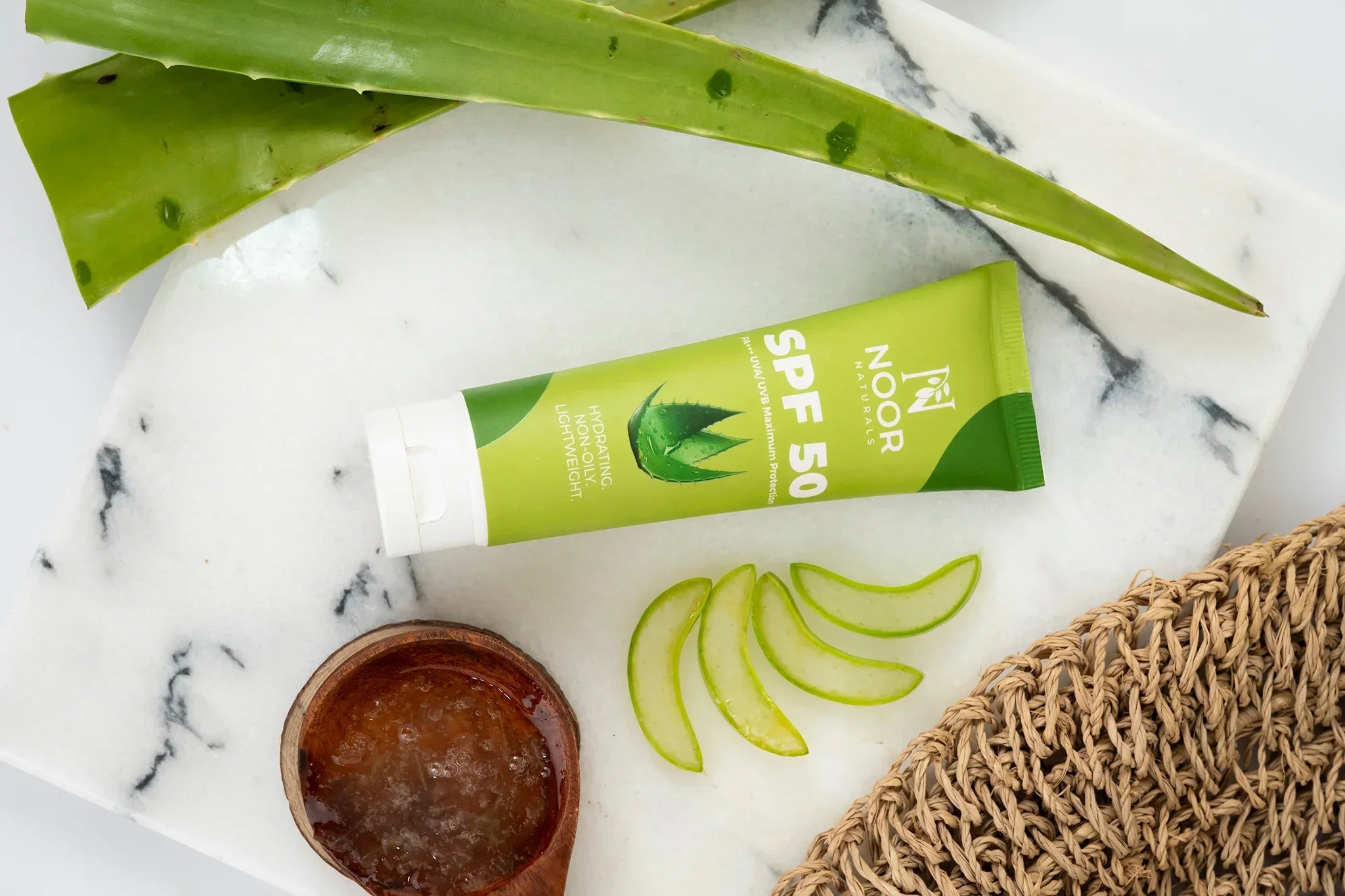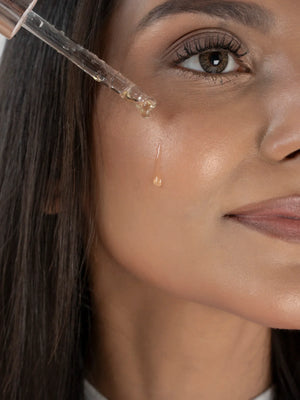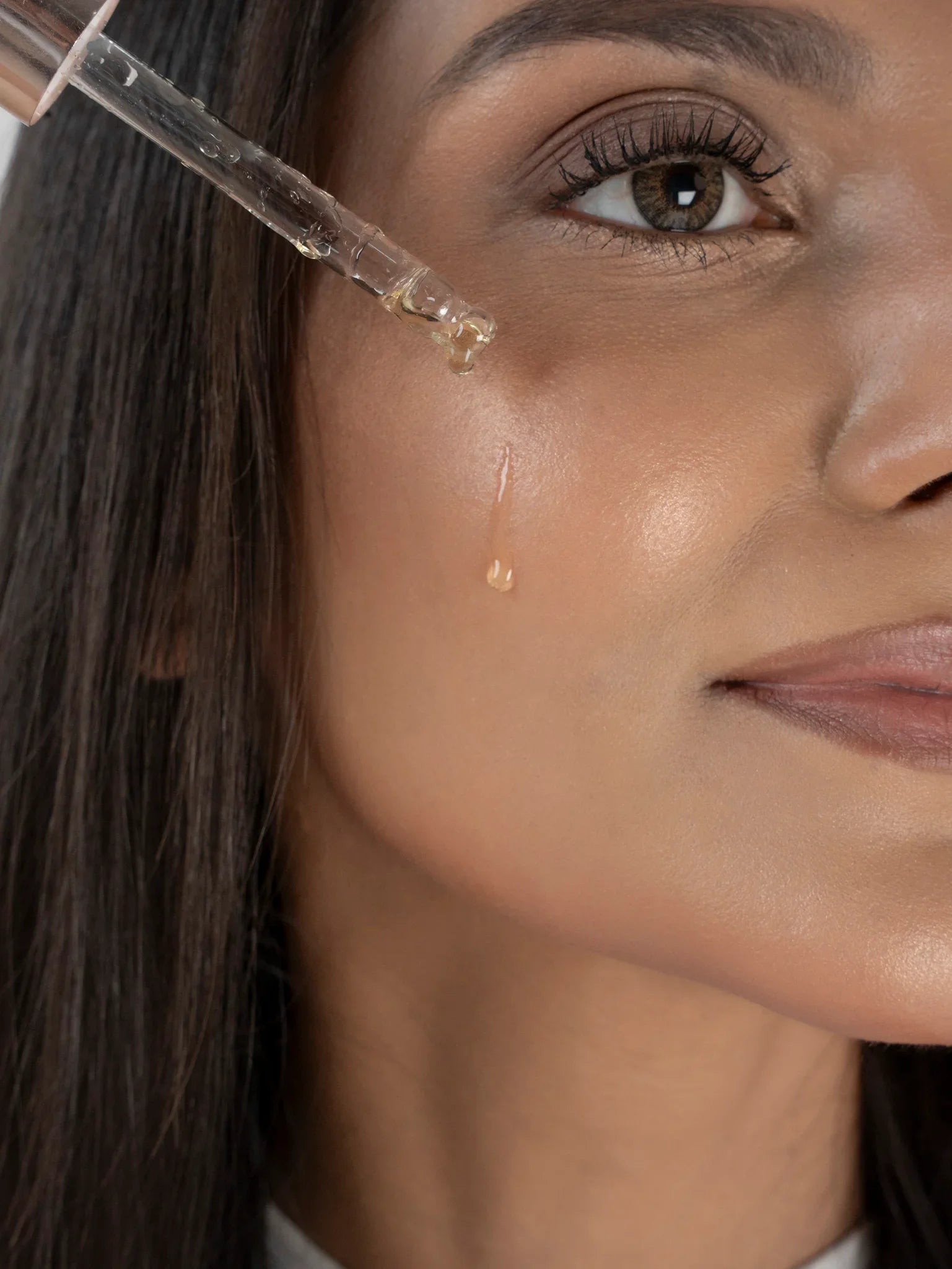“You don’t need sunscreen; we’re brown!”
If you've grown up in Pakistan, chances are you’ve heard some version of this — often from a friend, aunty, or even a doctor. But here’s the truth: melanin gives you some protection, yes — but not enough to skip sunscreen altogether. Especially not in 2025, in cities where UV indexes can hit 11+ in the summer.
Let’s break it all down — scientifically, practically, and locally.
🔬 What Exactly Is Sunscreen, and How Does It Work?
Sunscreen is a topical formulation that protects your skin from ultraviolet (UV) radiation — specifically UVA and UVB rays.
-
UVA rays penetrate deeper, causing collagen breakdown, wrinkles, sagging, and dark spots.
-
UVB rays are the culprits behind sunburn, tanning, and can mutate skin cell DNA, leading to skin cancer over time.
Depending on the type, sunscreen either:
-
Absorbs UV rays using chemical filters (e.g., avobenzone, octinoxate),
-
Or reflects/scatters rays using physical (mineral) filters like zinc oxide and titanium dioxide.
Both types are effective. What matters is how much you use, how often you reapply, and whether the product suits your skin type.
🌍 Why Sunscreen Is Crucial in Pakistan
Pakistan has:
-
High UV indexes year-round (8–11 in summer months)
-
Dusty, humid environments, especially in coastal cities
-
Widespread misinformation about sun protection
Contrary to popular belief, South Asian skin (Fitzpatrick types III–V) may tan slower, but is still highly prone to:
-
Post-inflammatory hyperpigmentation
-
Melasma
-
Sun-induced aging
-
Actinic keratosis (precancerous lesions)
Scientific Proof?
-
A 2021 study in the Journal of Dermatological Science confirmed that daily SPF 50+ use reduced pigmentation intensity in South Asian women by up to 35% in 8 weeks.
-
Another meta-analysis published in JAMA Dermatology concluded that sunscreen reduces photoaging, lowers skin cancer risk, and prevents melanin overproduction in deeper skin tones — especially with consistent use.
🕒 When & How to Use Sunscreen
✅ When?
Every. Single. Day. Even when:
-
It's cloudy
-
You're indoors with sunlight coming through windows
-
You're sitting next to your laptop for hours
UVA and visible light (from screens and LED bulbs) can still affect your skin barrier and pigmentation.
✅ How to Use It Properly?
-
Apply 15–20 minutes before stepping out.
-
Use 1/3 to 1/2 a teaspoon or Two Fingers Full for your face and neck.
-
Reapply every 2–3 hours, especially if you're sweating, oily, or outside.
-
Use before makeup, after moisturizer.
✅ Should I Use It at Night?
No — sunscreen is inactive without UV rays. At night, switch to a hydrating serum or treatment like Vitamin C or Retinol.
📚 What to Look for in a Good Sunscreen — The Science
Choosing a sunscreen can be overwhelming — SPF? PA? Mineral? Gel? Let’s break it down:
| Label | What it Means | Why it Matters |
|---|---|---|
| SPF 50 | Blocks ~98% of UVB rays | High enough for Pakistan’s intense sun |
| PA+++ or PA++++ | Rates UVA protection | More "+" = better anti-aging + anti-pigmentation |
| Broad Spectrum | Covers both UVA + UVB | A must-have, especially for melasma-prone skin |
| Non-comedogenic | Won’t clog pores | Ideal for oily, acne-prone skin |
| Water-resistant | Stays on despite sweat | Great for outdoor workers or beach trips |
| No white cast | Leaves no chalky film | Important for brown/tan complexions |
🧪 Dermatologists often recommend hybrid sunscreens — blends of chemical and physical filters for better aesthetics and comfort.
🧴 Mineral vs. Chemical Sunscreens — What’s Best for You?
-
Mineral (Physical): Uses zinc or titanium to reflect rays. Great for sensitive, rosacea-prone, or pregnant skin, but can leave a white cast.
-
Chemical: Uses filters like Uvinul A Plus, Mexoryl XL, or Octocrylene to absorb rays. Lighter texture, more transparent, better for deep skin tones.
In Pakistan, with heat, sweat, and humidity, chemical or hybrid formulas are often more wearable day-to-day — especially under makeup or for men with beards.
🛍️ Top Sunscreens in Pakistan Right Now (2025 Picks)
Let’s keep it honest — here are top-rated, dermatologist-approved options, including Noor Naturals and other trusted names:
⭐ Noor Naturals Aloe Vera SPF 50 PA+++
Best Local Budget Option
-
Aloe vera + Hyaluronic Acid = hydration & soothing
-
Broad spectrum, non-greasy finish
-
No white cast, no fragrance
-
Price: ~Rs. 850
-
Great for: Normal to dry skin, everyday wear
🌟 Noor Naturals Vitamin C SPF 50 PA+++
For Brightening & Urban Pollution
-
Includes stabilized 10% Vitamin C
-
Ideal for city dwellers dealing with dullness or pigmentation
-
Layers well under makeup
-
Great for: Oily, pigmented, urban-exposed skin
🧊 Isntree Hyaluronic Acid Watery Sun Gel SPF 50+
Top Korean Choice
-
No cast, intensely hydrating
-
Lightweight gel — feels like serum
-
Rs. 4,500 approx (imported)
-
Best for: Combination and dehydrated skin
🧴 La Roche-Posay Anthelios Invisible Fluid SPF 50+
Gold Standard Worldwide, Available at Naheed, Carrefour, Online (Click Above)
-
Invisible finish, sweat- and water-resistant
-
Trusted by derms globally
-
Expensive (~Rs. 6,000+)
-
Best for: Oily/acne-prone or outdoor users
🟡 Nivea Sun Protect & Moisture SPF 50
Readily Available in Pharmacies, Naheed.pk and Final Choice.
-
Moisturizing lotion texture
-
Affordable and effective
-
Some fragrance, so patch test first
-
Best for: Body, travel, family use
💬 FAQs — Real Questions from Desi Users
Q: I’m dark-skinned. Do I still need sunscreen?
Yes. Melanin helps, but only blocks about 13% of UVB rays. Hyperpigmentation, melasma, and premature aging still happen — sunscreen reduces all of that.
Q: Can sunscreen cure pigmentation?
It can’t reverse old spots, but it can stop new ones and prevent existing spots from worsening.
Q: I wear a niqab/hijab. Do I still need sunscreen?
Yes — on exposed areas like hands, forehead, or even under a sheer dupatta. UV rays penetrate fabrics unless they're tightly woven.
Q: I get pimples after sunscreen. What should I do?
Switch to a non-comedogenic, fragrance-free sunscreen. Avoid thick creams or occlusive oils. Noor Naturals Aloe Vera sunscreen is tested on acne-prone skin.
🧪 Final Thoughts — Sunscreen as Your First Line of Defense
Think of sunscreen as your daily insurance policy. You won’t notice its effect immediately — but six months down the line, you’ll realize you’ve:
-
Aged slower,
-
Tanned less,
-
Kept pigmentation under control,
-
Protected your skin barrier for the long haul.
Don’t chase fairness creams. Don’t rely only on serums. Sunscreen is step zero, not step five.
💡 Where to Start?
If you’re new to sunscreen:
-
Try Noor Naturals Aloe SPF 50 for a safe, affordable daily base.
-
Already using actives like Vitamin C or BHA? Add Noor Naturals Vitamin C SPF to enhance protection.
-
Want hydration? Grab the Isntree Watery Gel (pricey but silky).
-
For body, go for Nivea Protect & Moisture SPF 50 — it's widely available.
📦 Shop Now
🧴 Noor Naturals Sunscreens — Sun Screens
💬 Have questions? Drop us a message us on Instagram.



